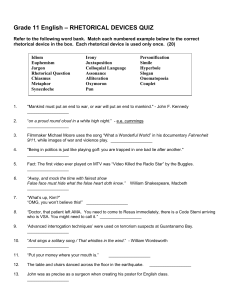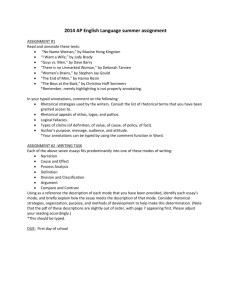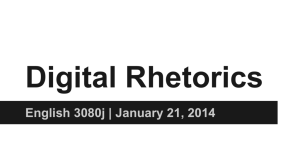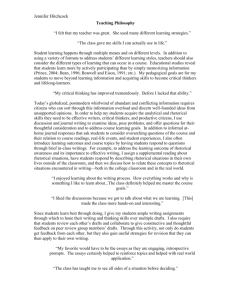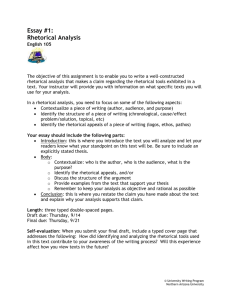Achievement Requirements
advertisement
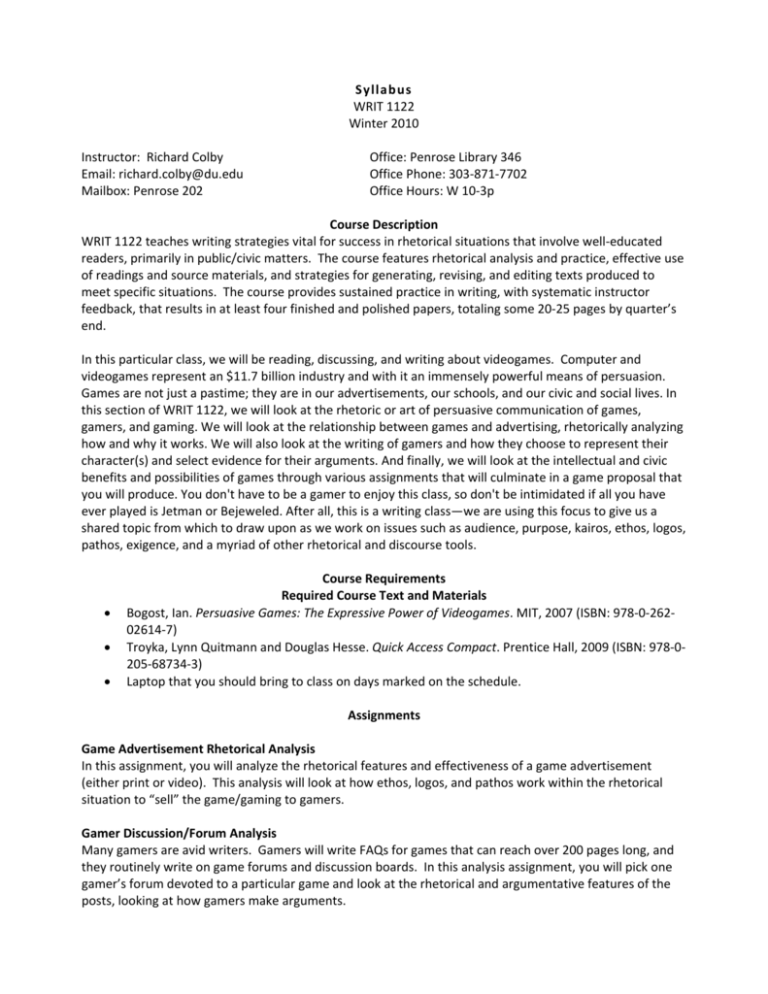
Instructor: Richard Colby Email: richard.colby@du.edu Mailbox: Penrose 202 Syllabus WRIT 1122 Winter 2010 Office: Penrose Library 346 Office Phone: 303‐871‐7702 Office Hours: W 10‐3p Course Description WRIT 1122 teaches writing strategies vital for success in rhetorical situations that involve well‐educated readers, primarily in public/civic matters. The course features rhetorical analysis and practice, effective use of readings and source materials, and strategies for generating, revising, and editing texts produced to meet specific situations. The course provides sustained practice in writing, with systematic instructor feedback, that results in at least four finished and polished papers, totaling some 20‐25 pages by quarter’s end. In this particular class, we will be reading, discussing, and writing about videogames. Computer and videogames represent an $11.7 billion industry and with it an immensely powerful means of persuasion. Games are not just a pastime; they are in our advertisements, our schools, and our civic and social lives. In this section of WRIT 1122, we will look at the rhetoric or art of persuasive communication of games, gamers, and gaming. We will look at the relationship between games and advertising, rhetorically analyzing how and why it works. We will also look at the writing of gamers and how they choose to represent their character(s) and select evidence for their arguments. And finally, we will look at the intellectual and civic benefits and possibilities of games through various assignments that will culminate in a game proposal that you will produce. You don't have to be a gamer to enjoy this class, so don't be intimidated if all you have ever played is Jetman or Bejeweled. After all, this is a writing class—we are using this focus to give us a shared topic from which to draw upon as we work on issues such as audience, purpose, kairos, ethos, logos, pathos, exigence, and a myriad of other rhetorical and discourse tools. Course Requirements Required Course Text and Materials • Bogost, Ian. Persuasive Games: The Expressive Power of Videogames. MIT, 2007 (ISBN: 978‐0‐262‐ 02614‐7) • Troyka, Lynn Quitmann and Douglas Hesse. Quick Access Compact. Prentice Hall, 2009 (ISBN: 978‐0‐ 205‐68734‐3) • Laptop that you should bring to class on days marked on the schedule. Assignments Game Advertisement Rhetorical Analysis In this assignment, you will analyze the rhetorical features and effectiveness of a game advertisement (either print or video). This analysis will look at how ethos, logos, and pathos work within the rhetorical situation to “sell” the game/gaming to gamers. Gamer Discussion/Forum Analysis Many gamers are avid writers. Gamers will write FAQs for games that can reach over 200 pages long, and they routinely write on game forums and discussion boards. In this analysis assignment, you will pick one gamer’s forum devoted to a particular game and look at the rhetorical and argumentative features of the posts, looking at how gamers make arguments. Academic/Popular/Advertisement Comparison As experienced academic writers, this assignment asks you to compare the rhetorical and argumentative structures of academic writing to those of game advertisements and gamer posts on forums. What are the similarities? Differences? Incongruities? Advertising Critical Analysis Bogost discusses three types of advertising: demonstrative, illustrative, and associative. Using this framework and the additional rhetorical and argumentative frameworks, evaluate the effectiveness of games used for advertising (so‐called advergames). You can use a particular game (e.g. Postopia) or a group of nearly identical games (e.g. Facebook hypertext or flash “games”). Politics Constructive Synthesis Language, work, school, games—everything is bound by an ideological frame. And ideologies lead to politics. Here, “construct” an idea for a political or ideological game using some research about a topic. You can use games that already exist as a potential template. Learning Critical Analysis/Constructive Synthesis Learning, especially as it is framed by school, is based on the dual theories of behaviorism and constructivism. In this assignment, you have a choice of either writing a critical analysis or a constructive synthesis based on our reading in Bogost and your more valuable experience as a student (and gamer). Final Game Project This major group project will provide you with an opportunity to practice some professional types of writing while synthesizing many things you have learned in the course. In groups of three, you will be writing a proposal, creating a proof‐of‐concept, and creating a 20 minute presentation about a persuasive game that your group will invent. Writing Conferences Through scheduled conferences with me, I can give specific and helpful feedback that you can apply to your writing. I encourage you to drop by to ask questions about your writing. I may require individual conferences depending on the progress of the class. In‐class Writing You will be asked to write something almost every day. Some of these writing assignments will be written in small groups, some will be written before class, and some will be written at the end of class. This work will usually be focused on the class readings and discussion. I will always collect these. Therefore, you should bring a writing instrument and paper every day, and you should try your best to get to class on time. Usually, these in‐class writings will be no longer than ten minutes. They are not graded on grammar or mechanics. They are merely to get you to think on paper. I will often use these writings as a measure of your class participation as well as your attendance. If you didn’t happen to actually do the reading or were not a part of the discussion, then you should write about what prevented you from either. Attendance and Participation Daily attendance is required. It is mandatory that you be present for class activities because your contributions will shape the evolution of learning in this class. Extended periods of absence will thwart collaborative efforts and impair class discussion. In other words, you have to do more than just show up‐‐ you have to actually be engaged with the course. Engagement is visible in a number of ways, including participation in classroom discussion, online discussions, and other conferences and discussions outside the classroom, peer review feedback, group project contributions, and general efforts to improve not only your own learning but the learning of the entire class. I understand that life sometimes gets in the way of school obligations. Illness, emergencies, narcolepsy, and alien abduction, among other things, might prevent you from attending class on time. My attendance policy is that you can miss two class sessions, no questions asked. My advice is that you save those two sessions for when you need them. If you miss more than three sessions, you will have to see me during my office hours so that we can discuss your situation. In the event of excessive absences (20% of class meetings or more), you will be encouraged to drop the course. It is your responsibility to communicate your situation to me as I cannot drop you from the course. If you just stop showing up, you will receive an F in the course. Occasionally, true emergencies arise. Please discuss missed class sessions with me as soon as possible; we will work together to accommodate your situation. If you do miss class, it is your responsibility to find out what you missed. Policies Computer Diversions I fully expect that you will bring your laptop to class every day. However, I would like you to remember the following: You are only in the class a few hours per week. In contrast, you have hundreds of hours outside of class during the week to do whatever you want on the computer. Therefore, during class time, I need you to focus on work and use your computer for that purpose. Facebooking, Surfing, chatting, gaming, downloading, and other such activities during class when you are not instructed to specifically do these things will not be tolerated. As a result, violations of this policy will have negative consequences. The first time you violate this rule, you will get a warning. Subsequent transgressions will be met with more severe consequences. Late Work All work— rough drafts and final copies— must be turned in on‐time. I will not accept late work unless you have made a previous arrangement with me. If you are unable to turn in an assignment for emergency reasons, inform me personally and as soon as possible. Please email me if you foresee a problem with getting your work in on time. The decision of whether or not I accept late work, regardless of excuse, is solely mine. Lost Essays You are responsible for maintaining a copy of each draft of your work. All of your work will be returned after it has been evaluated. It is your responsibility to keep a copy for this class. Additionally, in future writing classes and majors, you may be expected to demonstrate a portfolio of your work, so keep the writing you do for this class organized. Occasionally, essays are stolen, lost, or destroyed, so you should keep an additional copy of each essay and a back‐up in a safe place. Revision Policy Knowing how to revise your writing is an important aspect of being a successful writer; therefore, we will work on developing revision skills in this course. You will be required to write multiple drafts of each of your projects. I recommend that you put your efforts into working on your projects before turning in final versions. Take advantage of our class time, my office hours, and the Writing Center to get the help you need for your essays. I allow two revisions on a paper after it receives a grade. In other words, if you get a grade that you do not like, you can revise the project up to two times more. However, you must contact me prior to revising as I will always give specific directions and may ask you to do extra work. You cannot revise a project that already has a grade without first emailing/talking to me. Plagiarism There are many types of plagiarism and each has negative consequences on learning. We will discuss various forms of academic dishonesty, but it is my expectation from the beginning that you are responsible for your own work, that you collaborate fairly, and that you give credit where credit is due. More on the DU Student Honor Code can be found at http://www.du.edu/ccs/ Grading System Paper/Project/Assignment Grade scale I give essays and projects a letter grade. The letter grade corresponds to a number when computing a final grade (see table 1). For example, if you received a B on a 10‐point essay, that earns you 8.4 points towards your final grade. I realize that there are potentially tenths of a point gained and lost here, but this is not a course where partial credit or tenths of a point matter. A written draft or project either does what it needs to do or doesn’t—there is little value in itemizing instances of ethos, counting comma errors, or otherwise quantifying the results. Each assignment has its own grading criteria that are communicated to you through the assignment sheet, classroom discussion, lecture, instructor feedback, and specifically during peer review. If you are ever unsure about criteria for a particular assignment, please see me as soon as possible. Description Grade A A‐ B+ B B‐ C+ C C‐ D+ 100% 90% 87% 84% 80% 77% 74% 70% 67% 5 5.0 4.5 4.4 4.2 4.0 3.9 3.7 3.5 3.2 10 10.0 9.0 8.7 8.4 8.0 7.7 7.4 7.0 6.4 15 15.0 13.5 13.1 12.6 12.0 11.6 11.1 10.5 9.6 20 20.0 18.0 17.4 16.8 16.0 15.4 14.8 14.0 12.8 30 30.0 27.0 26.1 25.2 24.0 23.1 22.2 21.0 19.2 60% 3.0 6.0 9.0 12.0 18.0 0% 0.0 0.0 0.0 0.0 0.0 Superior work that exceeds all criteria Excellent work that exceeds some or most criteria Acceptable work that meets all criteria Acceptable work that barely meets all of the criteria Work that does not meet one or more of the criteria D NC or R Total Points Table 1: WRIT Grading Scale I do not give F’s on papers. During the regular course of the term, if you fail to meet the minimum requirements of a project, you will receive an R, which means “Must Revise.” You do not have to see me to revise an R, but it will always be due one week after you received the grade from me unless other arrangements have been made. The last regular week of the term (the week BEFORE finals week) is the last time you can turn in any revised paper. At the end, any R’s in my book are automatically computed as NC, which means you will receive No Credit and 0 points for that project. Project Grade Breakdown Project Attendance/Participation (inc. in‐class writing, discussion board and group work) Advertising Rhetorical Analysis Forum/Discussion Rhetorical Analysis Academic Comparison Advertising Critical Analysis Politics Constructive Synthesis Learning Critical Analysis/Constructive Synthesis Final Project % 15 10 10 10 10 10 10 25 Resources Writing Center One of the most useful resources offered in helping you achieve excellence in writing is the Writing Center. Any DU student may make an appointment for a consultation by calling 303.871.7456 or by using the online scheduling system at http://myweb.du.edu, "Student & Financial Aid" tab, "Writing and Research Center" menu. Although there are occasional walk‐in appointments available, it is best to schedule an appointment. Consultations in the Writing Center last 45 minutes, and can help you with any stage of the writing process. For more information, visit: http://www.du.edu/writing/student.htm Blackboard During the term, we will use frequently the Blackboard web content management system (CMS). You can visit the Blackboard site for this class by going to http://blackboard.du.edu and signing in with your DU information. Rough drafts and final drafts of papers will be submitted online via the blackboard site, and we will use the site occasionally for class discussions. Penrose Library The Penrose Library offers access to many online databases the provide access to thousands of articles for research and scholarship. A one‐to‐one consultation with a Reference Librarian can help you narrow down a research topic and find the best sources for your writing. In addition, the library maintains a sizeable collection of print books, journals, and government documents (3 million to be exact). Visit the library’s Services website at: http://library.du.edu/services/index.cfm for more information. Formatting and Style Unless otherwise stated, rough drafts and final versions for essays should be typed (word processed) and formatted as follows: • Modern Language Association (MLA) format for citations and presentation. Quick Access Compact has detailed examples and instructions for following this format. We will also be discussing this and other formats in class. • As per MLA format, work for this class should be typed, double‐spaced, and one‐sided, with 1” margins on the left, right, top and bottom of the page. • As per MLA format, your essay should have your last name and the page number in the upper right hand corner of each page. • Each essay should have a title, but not a separate title page. • You should use a 12‐point serif font, preferably Times, Times New Roman, or Courier You will be responsible for keeping all your drafts, specifically those drafts that have written comments on them from peers, others, and myself. Not all projects will follow MLA format, but more information regarding these will be communicated within the assignments. Success in WRIT 1122 While writing is difficult and sometimes frustrating work, you will ultimately find that it is richly rewarding. I want you to remember that everyone struggles at getting words on paper. I want to be a resource to help that process be more useful to you in the future. I’m not here to weed out the weak or “make” you into better writers. Ultimately, it is entirely under your own power to succeed in 1122 and writing in general. I encourage you to take advantage of all the resources at DU. I especially encourage you to visit or email me often with your writing concerns and questions.



